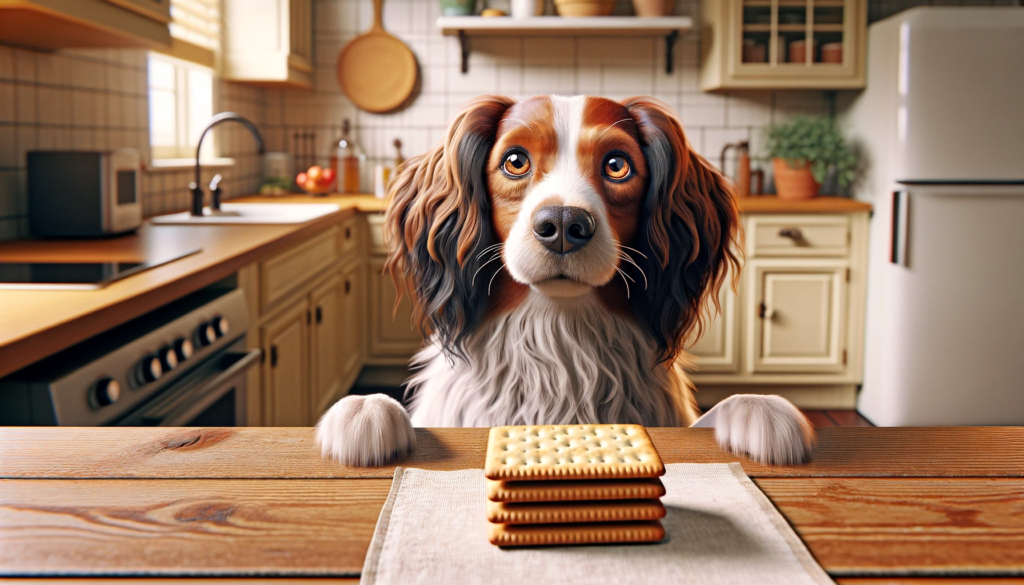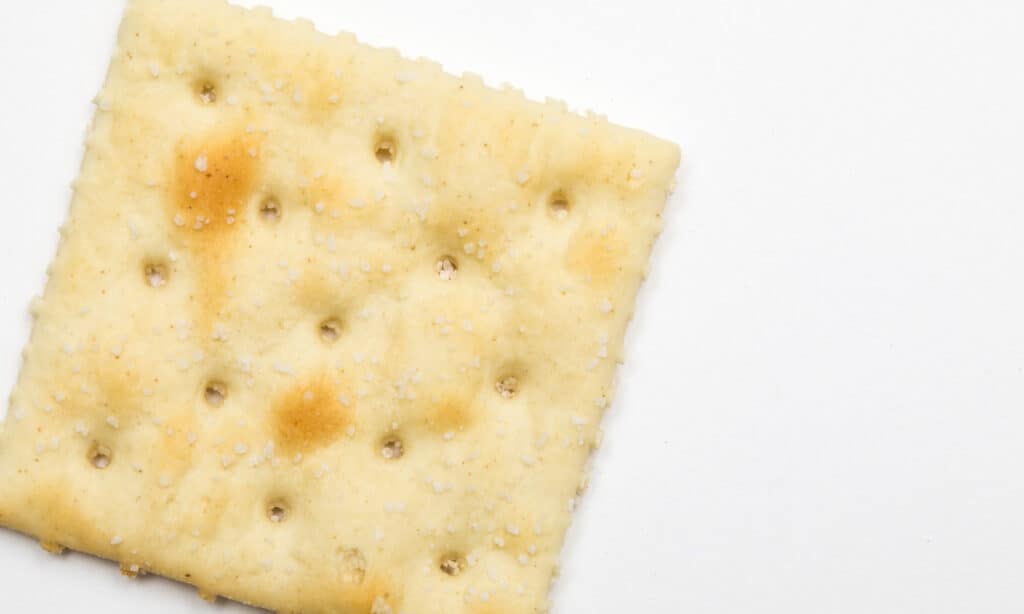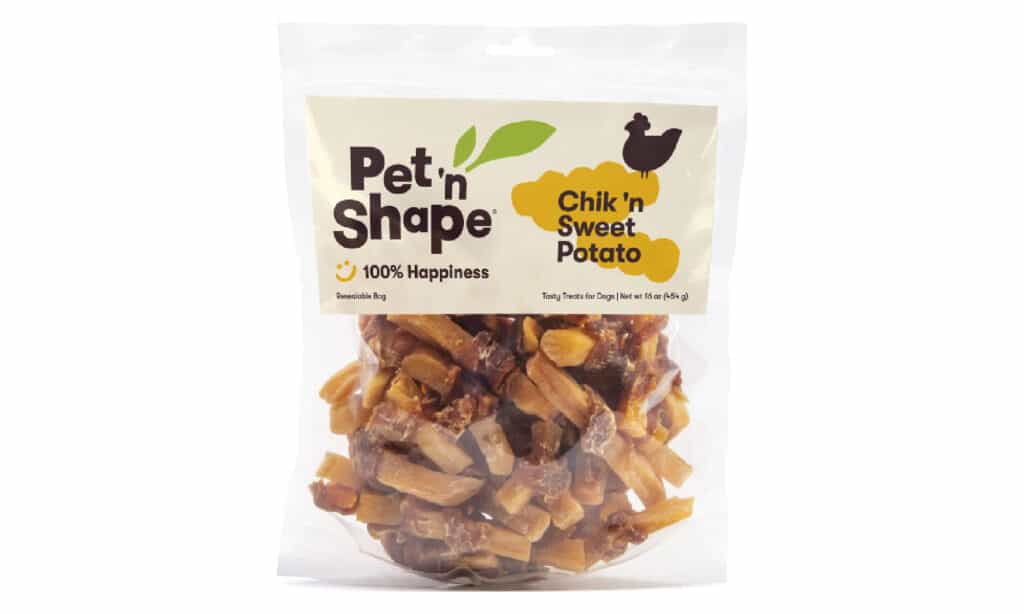It’s no secret that dogs have an insatiable love for food and often beg for a nibble of their human’s snacks. However, not all human foods are safe for our furry friends, and it can be challenging to discern which foods are suitable for sharing. One snack that pet owners may not give a second thought to sharing with their pooch is the humble Saltine cracker. But is it safe for dogs to eat Saltines, or should we avoid sharing this snack with them? In this post, we’ll dive deeper into the potential risks and benefits of feeding Saltines to dogs.

What Are Saltine Crakers?
Saltine crackers are those thin, crispy, salty crackers you probably have stashed away in your pantry. You know the ones – they’re perfect for topping with cheese, peanut butter, or whatever else you’re in the mood for. They’re made with basic ingredients like flour, water, salt, and yeast, and baked until they’re light and crunchy. You can recognize Saltines by their square shape and those little holes on top. And let’s not forget about that distinctively salty flavor that keeps us coming back for more! Whether you’re snacking on them straight out of the box or using them to jazz up your favorite dip, Saltine crackers are a classic snack that we all know and love.
Can Dogs Have Saltine Crackers?
While Saltine crackers are generally safe, they are not great to feed to our pups in large amounts. Dogs have different nutritional needs and digestive systems compared to humans, which means that not all human foods are safe or appropriate for them.
When it comes to Saltine crackers, there’s no immediate danger if your dog eats one or two accidentally. However, Saltines are high in sodium, which is not healthy for dogs in large amounts. Ingesting too much salt can lead to dehydration, kidney damage, and other health issues, particularly in dogs with pre-existing health conditions.
Furthermore, Saltine crackers don’t provide any significant nutritional value for dogs. They’re low in protein, fiber, and other essential nutrients that dogs need to thrive. So, while Saltines may be a tasty treat for us humans, they should not be a regular part of a dog’s diet.
Harmful Ingredients in Saltine Crackers:
While Saltine crackers are generally considered safe for human consumption in moderation, there are a few ingredients in these crackers that can be harmful if consumed in large amounts.
One of the main ingredients in Saltine crackers is salt, and as previously mentioned, too much sodium can be dangerous for dogs. Consuming too much salt can cause excessive thirst, dehydration, and in severe cases, can lead to kidney damage or even death. Saltine crackers contain refined flour lacking fiber/nutrients of whole grains and can cause weight gain and health issues.
In addition to these concerns, some brands of Saltine crackers may contain artificial flavors, colors, and preservatives that can be harmful to dogs. For example, BHA and BHT are commonly used as preservatives in processed foods, including some brands of Saltines. These chemicals have been linked to cancer and other health issues in dogs and should be avoided whenever possible.
While it’s unlikely that your dog will experience any immediate harm from eating a Saltine cracker or two, it’s essential to be mindful of the ingredients and potential risks associated with feeding them to your furry friend.

Safe Ingredients in Saltine Crackers:
When it comes to safe ingredients in Saltine crackers, there aren’t many that are particularly beneficial for dogs. While Saltines are not toxic to dogs, they don’t provide any significant nutritional value either.
Saltines are primarily made up of flour, water, and salt, with some brands including additional ingredients like yeast, sugar, and soybean oil. These ingredients are generally considered safe for dogs to consume in small amounts, but they don’t offer any substantial health benefits.
What Signs To Watch For If Your Dog Accidentally Ate A Lot of Saltine Crackers?
If your dog accidentally eats a large quantity of Saltine crackers, it’s important to monitor them closely for any signs of discomfort or illness. Some signs to watch for include:
- Excessive thirst: Excessive salt intake can make your dog excessively thirsty and increase water consumption.
- Upset stomach: Saltine crackers can be difficult for dogs to digest, especially if they’ve eaten a large amount. Your dog may experience diarrhea, vomiting, or abdominal pain as a result.
- Dehydration: Too much salt can cause dehydration, which can be dangerous for dogs. Signs of dehydration include dry mouth, sunken eyes, lethargy, and loss of appetite.
- Restlessness or pacing: If your dog is experiencing discomfort or pain, they may be restless or pace around the house.
- Increased urination: Saltines can increase urination in dogs, leading to more frequent potty breaks.
If you notice any of these symptoms in your dog after they’ve eaten Saltine crackers, it’s important to contact your veterinarian right away. Depending on the severity of your dog’s symptoms, your vet may recommend supportive care, such as IV fluids or medications to manage their symptoms. In severe cases, your dog may need to be hospitalized for treatment.
When or If You Should Go To The Vet?
If your dog has accidentally eaten a large quantity of Saltine crackers and is experiencing any of the following symptoms, you should seek veterinary care immediately:
- Severe vomiting or diarrhea: Excessive vomiting or diarrhea in dogs can lead to dehydration, which is dangerous if left untreated.
- Lethargy or weakness: Unusual fatigue or weakness, difficulty standing or walking, may signal a serious health issue in dogs.
- Excessive thirst or urination: Unusual fatigue or weakness, difficulty standing or walking, may signal a serious health issue in dogs.
- Rapid heartbeat or difficulty breathing: Elevated heart rate or breathing difficulties in dogs may indicate a serious condition that requires immediate veterinary care.
If your dog is experiencing any of these symptoms, it’s important to contact your veterinarian right away or take them to an emergency veterinary clinic. In less severe cases, you may be able to monitor your dog’s symptoms at home and provide supportive care, such as offering small amounts of water and a bland diet to help settle their stomach. However, it’s always better to err on the side of caution and seek veterinary care if you have any concerns about your dog’s health.

Safe Dog-Friendly Alternative to Saltine Crackers:
If you’re looking for a safe and healthy alternative to Saltine crackers to offer your dog, there are plenty of options to choose from! Here are a few dog-friendly alternatives that are both tasty and nutritious:
- Carrots: Carrots are low in calories and high in fiber, making them a great snack for dogs. They’re also rich in vitamin A, which is essential for maintaining healthy skin and eyesight.
- Green beans: Green beans are another low-calorie, high-fiber snack that many dogs enjoy. They’re also a good source of vitamins and minerals, including vitamin C, vitamin K, and potassium.
- Apple slices: Apples are a healthy snack for dogs in moderation. Apples provide fiber, vitamin C, and antioxidants but remove seeds and core, which can harm dogs.
- Peanut butter: Many dogs love peanut butter, which is a good source of protein and healthy fats. Moderation is key with natural, unsalted peanut butter for dogs due to its high-calorie content.
- Rice cakes: Rice cakes are a low-calorie, low-sodium alternative to Saltine crackers that many dogs enjoy. They’re also a good source of complex carbohydrates, which can provide energy and help keep your dog feeling full.
Remember, when introducing any new food into your dog’s diet, it’s important to do so gradually and in moderation to avoid digestive upset or other health issues.
Healthy Store-Bought Options:
In conclusion, while Saltine crackers may seem like a harmless and tasty snack to share with your dog, they’re not particularly beneficial for their health and can even be harmful if consumed in large amounts. High in sodium and lacking in essential nutrients, Saltines should be avoided as a regular part of your dog’s diet. Instead, consider offering your furry friend healthy, dog-friendly alternatives like carrots, green beans, and apple slices, which are not only safe but also provide valuable nutrition. As always, consulting with your veterinarian is the best way to ensure that your dog is receiving a balanced and healthy diet that meets their individual needs.
~Lindsie


